Dandruff is a common scalp issue that causes flaking, itching, and discomfort, affecting people of all ages. While various products promise relief, a growing number of people are turning to scalp scrubbers as a gentle tool to manage dandruff.
Scalp scrubbers, often made with soft silicone bristles, are designed to exfoliate dead skin, boost circulation, and remove product buildup, all of which can contribute to a healthier scalp. But do they truly make a difference in reducing dandruff?
This article explores the effectiveness of scalp scrubbers for dandruff, discussing how they work, their benefits, limitations, and tips for incorporating them into your hair care routine.
How Do Scalp Scrubbers Work?
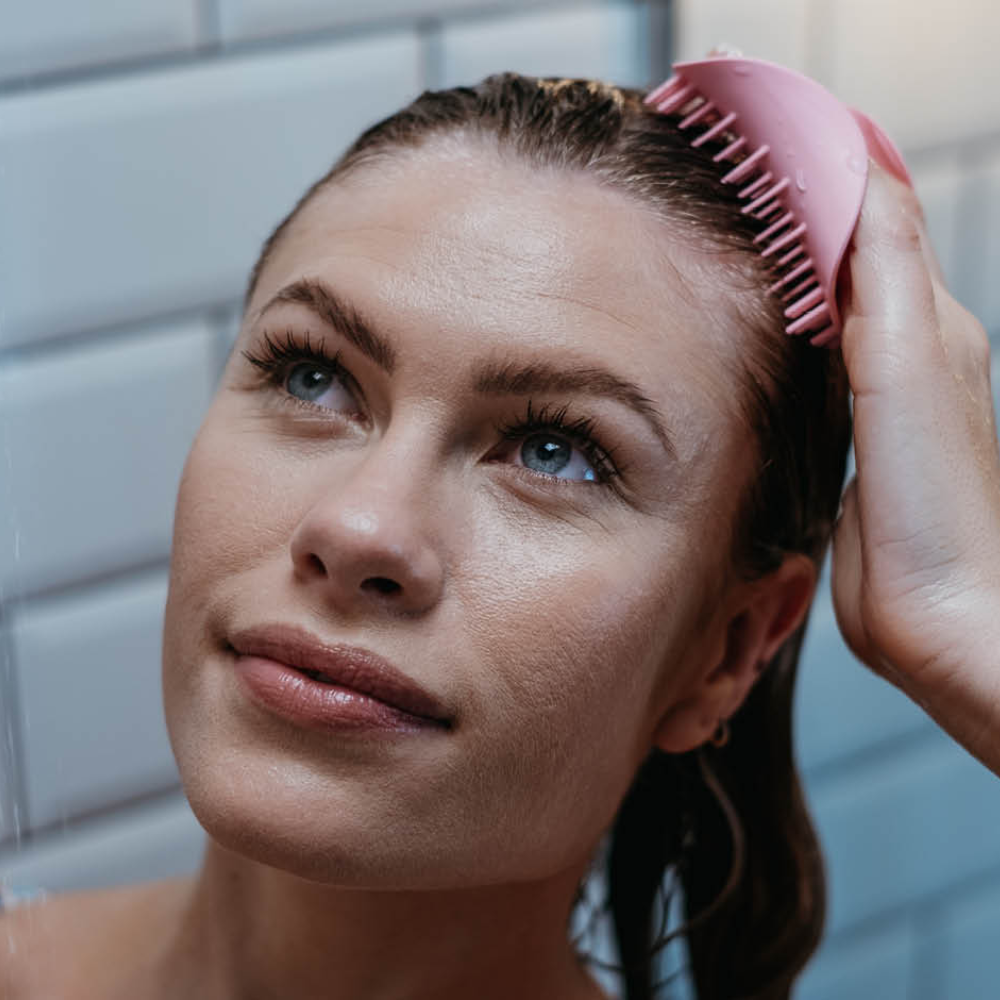
Scalp scrubbers work through gentle massaging and exfoliation. Scrubbing the scalp with soft bristles helps loosen and remove dead skin cells, product buildup, and excess oil, which can contribute to dandruff. Additionally, massaging the scalp can stimulate blood circulation and promote a healthier environment for hair growth.
Furthermore, using a scalp scrubber can also enhance the effectiveness of your shampoo and other hair products. By removing buildup and allowing better product penetration, you may see improved results from your anti-dandruff products.
What Causes Dandruff?
Before diving into scalp scrubbers, it's essential to understand the causes of dandruff.
Dandruff can be triggered by various factors, such as dry skin, certain skin conditions (e.g., eczema and psoriasis), hormonal changes, stress, and even a fungus called Malassezia.
The overgrowth of this fungus on the scalp can cause irritation and inflammation, leading to excessive flaking. This is why many anti-dandruff shampoos contain antifungal ingredients like pyrithione zinc or ketoconazole.
Does a Scalp Scrubber Help With Dandruff?
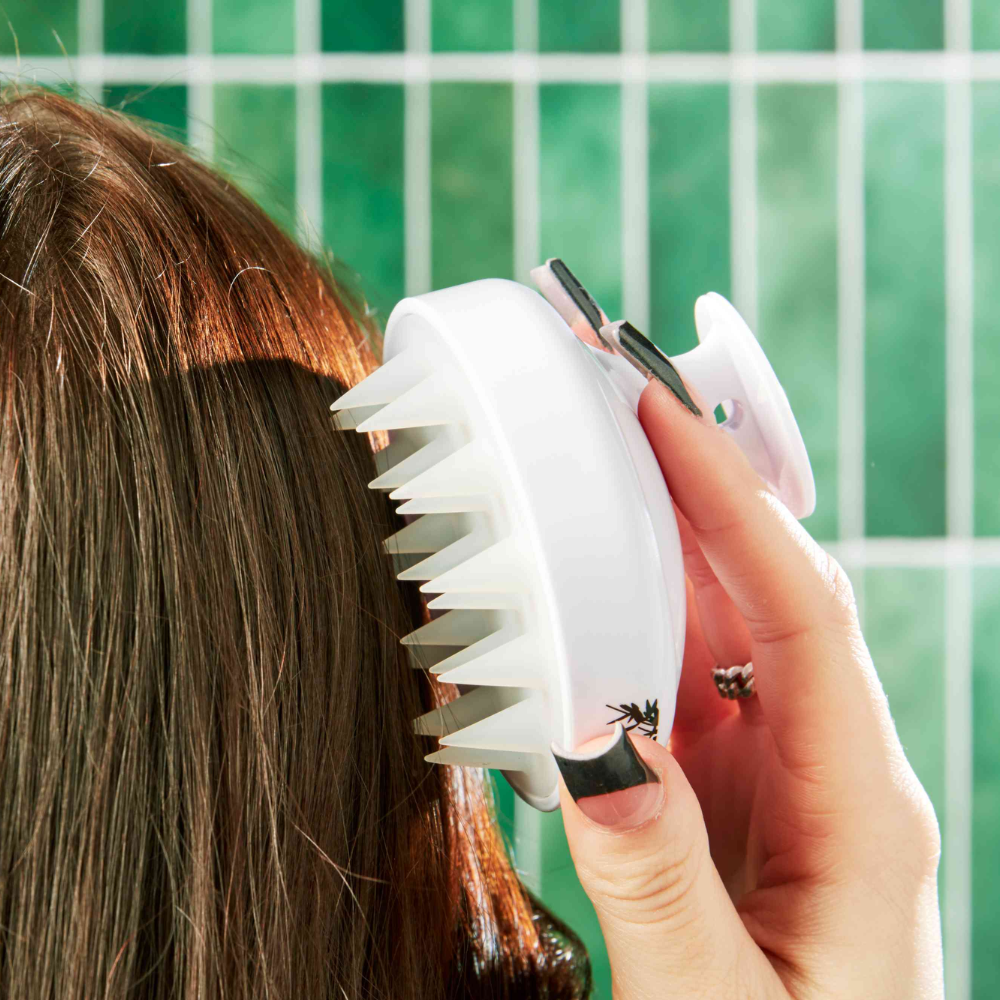
The use of scalp scrubbers for dandruff is largely anecdotal, with limited scientific research to support their effectiveness. However, many people report positive results when incorporating a scalp scrubber into their hair care routine.
Some individuals claim that regular use of a scalp scrubber has reduced their dandruff significantly or even eliminated it altogether. Others have noticed improved hair health and less itching and irritation on the scalp.
Also, keep in mind that a scalp scrubber is just one tool in managing dandruff and may not be a cure-all. To see the best results, it's crucial to maintain good hygiene practices, use anti-dandruff products, and consult with a dermatologist if necessary.
Benefits of Using a Scalp Scrubber for Dandruff
Using a scalp scrubber for dandruff offers several benefits, enhancing both scalp and hair health.
Firstly, it effectively exfoliates the scalp, removing dead skin cells and reducing flakiness, which can prevent dandruff from worsening. This exfoliation also helps to combat product buildup and excess oil, fostering a clean and fresh environment for your hair follicles.
Secondly, the massaging action of a scalp scrubber stimulates blood circulation, enhancing nutrient delivery to the scalp, which can encourage healthier hair growth. Moreover, improved circulation and thorough cleaning can lead to better absorption of anti-dandruff shampoos and treatments, potentially increasing their effectiveness.
Some users report reduced itching and irritation, contributing to overall comfort. Additionally, incorporating a scalp scrubber into your routine provides a relaxing self-care experience, which can help alleviate stress—one of the contributing factors to dandruff. While a scalp scrubber may not replace medical treatments, it can be a valuable addition to your hair care regimen.
Tips for Using a Scalp Scrubber
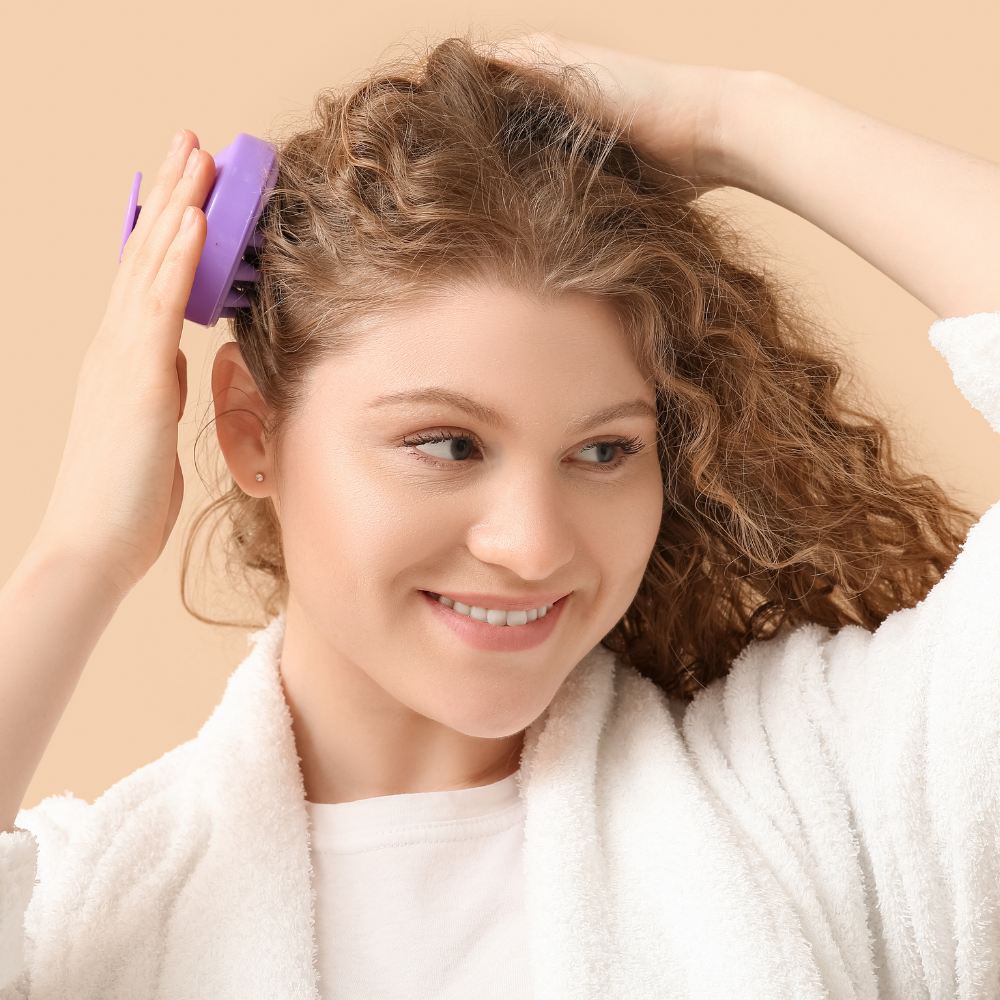
If you decide to try using a scalp scrubber for dandruff, here are some tips to keep in mind:
- Choose a gentle scalp scrubber with soft silicone bristles to avoid further irritation or damage.
- Use the scrubber in circular motions around your entire scalp while shampooing or applying other hair products.
- Be mindful of the pressure applied and avoid scrubbing too vigorously, as it can cause redness or inflammation.
- Use the scalp scrubber once or twice a week as needed. Overuse may lead to dryness and further aggravation of dandruff.
- Rinse the scalp thoroughly after using the scrubber to remove any loosened flakes or debris.
- Consult with a dermatologist if you experience severe dandruff or irritation after using a scalp scrubber.
These tips can help you safely and effectively use a scalp scrubber in your hair care routine to manage dandruff. Remember to listen to your scalp and adjust usage as needed for the best results.
Alternative Remedies for Dandruff
While scalp scrubbers may work for some individuals, they are not the only solution for managing dandruff. Some alternative remedies that people have found helpful include:
- Tea tree oil: Known for its antifungal and antibacterial properties, tea tree oil can help reduce the fungus responsible for causing dandruff. Dilute a few drops of tea tree oil with a carrier oil like coconut or olive oil and massage it onto your scalp.
- Apple cider vinegar: The acidity in apple cider vinegar can help balance the pH level of the scalp, reducing excess oil and flakes. Mix equal parts water and apple cider vinegar and use it as a rinse after shampooing.
- Aloe vera: With its soothing and anti-inflammatory properties, aloe vera can help calm an itchy scalp and reduce dandruff. Apply fresh aloe vera gel onto the scalp and leave it on for 30 minutes before rinsing off.
It's essential to note that while these alternative remedies may work for some individuals, they may not be suitable for everyone. It's always best to consult with a dermatologist before trying new products or treatments for dandruff. They can provide personalized recommendations based on your specific needs and concerns.
How To Choose the Right Scalp Scrubber
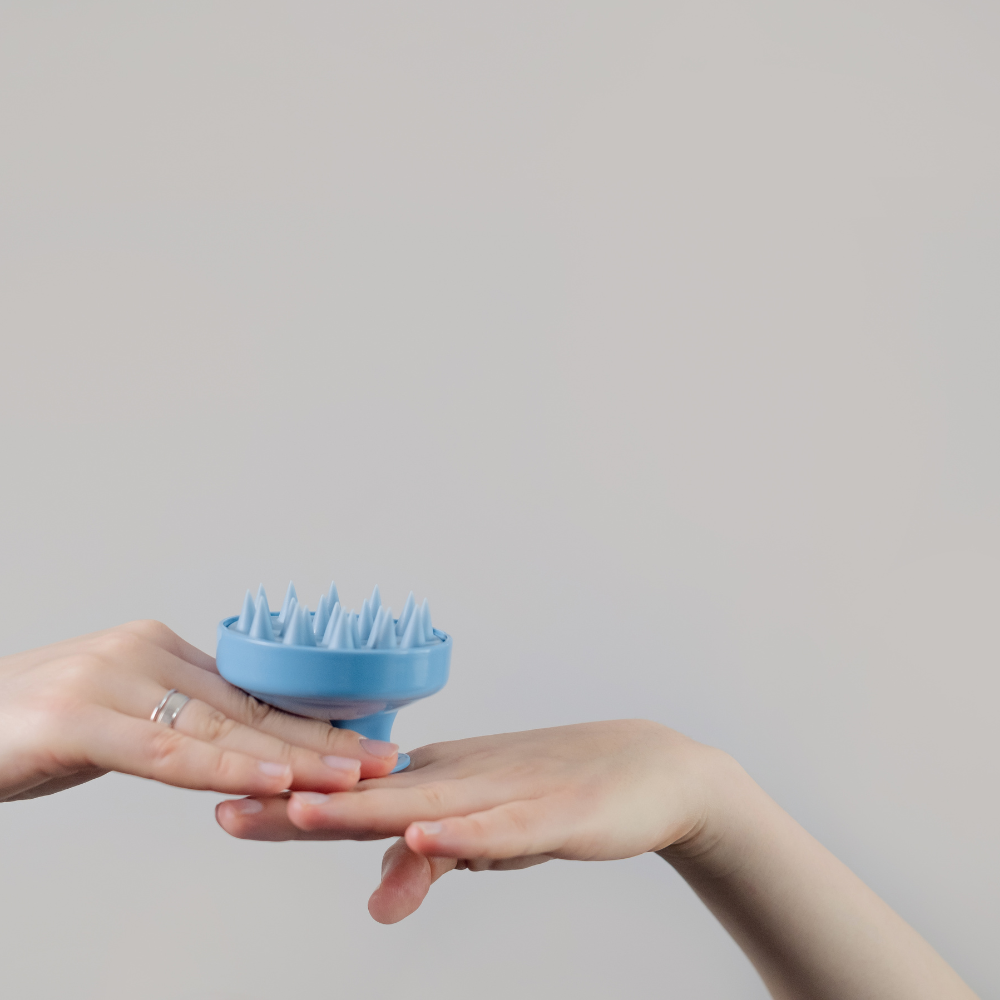
When shopping for a scalp scrubber, keep these factors in mind to choose the right one for your needs:
- Bristle type: Look for a silicone scrubber with soft bristles to prevent damage or irritation on the scalp.
- Size and shape: Consider the size and shape of the scrubber to ensure it can reach all areas of your scalp comfortably.
- Material: Avoid scrubbers made with harsh materials, as they can cause further irritation on sensitive scalps. Opt for silicone or natural materials like bamboo instead.
- Additional features: Some scalp scrubbers come with added features like handle grips or different bristle lengths. Consider what features are important to you and your hair care routine.
- Price: Scalp scrubbers can range in price, so consider your budget and how much you're willing to invest in a scalp scrubber. Remember that a higher price does not always equate to better quality.
By considering these factors, you can choose a scalp scrubber that works best for your hair and scalp needs. Remember to always read reviews and do research before purchasing to ensure you are getting a quality product.
FAQs
Does using a scalp brush help with dandruff?
Yes, using a scalp brush can help with dandruff by promoting scalp exfoliation, removing flakes, and improving blood circulation for a healthy scalp.
Can I use a scalp massager shampoo brush on wet or dry hair?
A scalp massager shampoo brush can be used on both wet or dry hair, providing benefits like scalp massage and exfoliation regardless of hair condition.
How does a scalp massage contribute to a healthy scalp?
A scalp massage helps maintain a healthy scalp by increasing blood flow, reducing tension, and supporting scalp exfoliation, which can alleviate dandruff.
What benefits do scalp brushes offer for stimulating hair growth?
Scalp brushes, including scalp massager brushes, can stimulate hair growth by enhancing blood circulation and ensuring a clean scalp environment.
Is a scalp massager effective on dry hair for dandruff control?
Using a scalp massager on dry hair can still be effective for dandruff control by gently exfoliating the scalp and removing build-up that contributes to flakes.
How do scalp massage brushes aid in scalp health?
Scalp massage brushes aid in scalp health by providing a gentle massage that promotes relaxation, exfoliates the scalp, and supports overall hair and scalp care.
Conclusion
In conclusion, a scalp scrubber may be a helpful tool in managing dandruff by exfoliating the scalp, stimulating blood circulation, and enhancing product absorption. However, it should not be solely relied upon as a solution for dandruff and should be used in conjunction with other hair care practices and products.
Remember to always listen to your scalp and consult with a professional if you experience persistent or severe dandruff. With proper care and attention, you can effectively manage dandruff and promote healthier hair and scalp.
So, do some research on different types of scalp scrubbers available in the market to find one that suits your needs best! Happy scrubbing! Let's keep our scalp and hair healthy!
Subscribe to our email newsletter and unlock access to members-only content and exclusive updates.
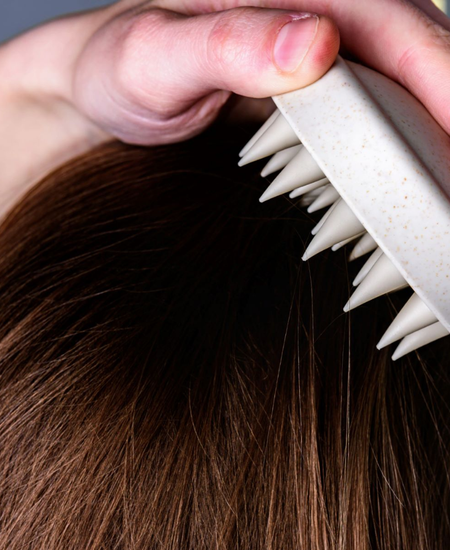
Comments